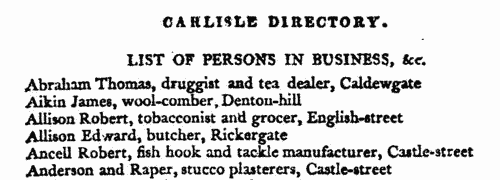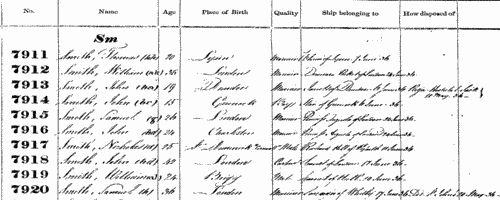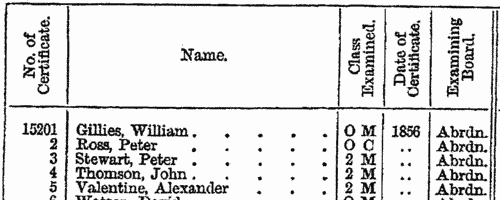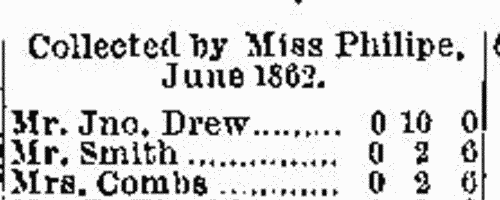Moffet Surname Ancestry ResultsOur indexes 1800-1900 include entries for the spelling 'moffet'. In the period you have requested, we have the following 16 records (displaying 1 to 10): Buy all | | | Get all 16 records to view, to save and print for £96.00 |
These sample scans are from the original record. You will get scans of the full pages or articles where the surname you searched for has been found. Your web browser may prevent the sample windows from opening; in this case please change your browser settings to allow pop-up windows from this site. Inhabitants of Brampton in Cumberland
(1811)
F. Jollie and Sons of Carlisle printed this Cumberland Guide and Directory 'containing a Descriptive Tour through the County, and a List of Persons in Public and Private Situations in every Principal Place in the County'. The sample scan is from the Carlisle directory: this is the index to Brampton. MOFFET. Cost: £6.00.  | Sample scan, click to enlarge

| London Traders
(1814)
The fifteenth edition of The Post-Office Annual Directory includes this 'List of More than 17,000 Merchants, Traders, &c. of London, and Parts Adjacent', arranged alphabetically by surname, with trade in italics, and address.MOFFET. Cost: £4.00.  | Sample scan, click to enlarge

| Manchester Directory
(1825)
W. Parson compiled this Manchester trades directory included in the second volume of the History, Directory, and Gazetteer of the County Palatine of Lancaster, by Edward Baines, published in 1825. The names are arranged alphabetically by surname and christian name, with address, including house numbers where appropriate.MOFFET. Cost: £4.00.  | Sample scan, click to enlarge

|  British merchant seamen
(1835-1836) British merchant seamen
(1835-1836)
At this period, the foreign trade of ships plying to and from the British isles involved about 150,000 men on 15,000 ships; and the coasting trade about a quarter as many more. A large proportion of the seamen on these ships were British subjects, and so liable to be pressed for service in the Royal Navy; but there was no general register by which to identify them, so in 1835 parliament passed a Merchant Seamen's Registration Bill. Under this act this large register of British seamen was compiled, based on ships' crew lists gathered in British and Irish ports, and passed up to the registry in London. Each seaman was assigned a number, and the names were arranged in the register by first two letters of the surname (our sample scan shows one of the pages for 'Sm'); in addition, an attempt was made to separate out namesakes by giving the first instance of a name (a), the second (b), and so on. But no effective method was devised to prevent the same man being registered twice as he appeared in a second crew list; moreover, the original crew lists were clearly difficult for the registry clerks to copy, and some of the surname spellings appear to be corrupted. A parliamentary committee decided that the system devised did not answer the original problem, and this register was abandoned after less than two years: but it is an apparently comprehensive source for British merchant seamen in 1835 to 1836. The register records the number assigned to each man; his name; age; birthplace; quality (master, captain, mate, 2nd mate, mariner, seaman, fisherman, cook, carpenter, boy &c.); and the name and home port of his ship, with the date of the crew list (usually at the end of a voyage). Most of the men recorded were born in the British Isles, but not all (for instance, Charleston and Stockholm appear in the sample scan). The final column 'How disposed of' is rarely used, and indicates those instances where a man died, was discharged, or deserted his ship during the voyage.MOFFET. Cost: £8.00.  | Sample scan, click to enlarge

| Dissolutions of Partnerships
(1837)
Trade partnerships dissolved, or the removal of one partner from a partnership of several traders: in England and Wales
MOFFET. Cost: £6.00.  | Sample scan, click to enlarge

| Unclaimed Dividends
(1855)
The unclaimed dividend books of the Bank of England, containing names and descriptions of over 20,000 persons entitled to many millions of pounds accumulated in the bank unclaimed during the 18th and 19th centuries, mostly in consols and annuities, and transferred to the Commissioners for the Reduction of the National Debt.
MOFFET. Cost: £6.00.  | Sample scan, click to enlarge

| Masters and Mates of Merchantmen: Certificates of Competency
(1857)
The Mercantile Navy List and Annual Appendage to the Commercial Code of Signals for All Nations, edited by J. H. Brown, was published By Authority in 1857. It includes this full list of 'Masters and Mates who have passed their examination and obtained Certificates of Competency', from number 1 to number 15816, except for those whose certificates had been cancelled. The first column gives the number of certificate; the second column full name, surname first (an asterisk before the name denotes those who are found qualified to act in fore and aft-rigged vessels only; two vertical lines denotes in North Wales fishery only; a double dagger, passed the examination in steam; and a dagger refers to honorary testimonials, details of which are printed at the end of the section. A B C D are the distinguishing letters for the four classes of Meteorological Observers); third column, class examined (1 ex, 1, 2 and 3 denote First Extra, First, Second and Third Class Master's Certificate, granted under the Voluntary Examination, by Order in Council dated August 1845; Ex C, Master Extra; O C, Master Ordinary; 1 M, First Mate; O M, Only Mate; 2 M, Second Mate; L. R. N., Lieutenant Royal Navy; M. R. N., Master Royal Navy; E. I. C., East India Company; M. I. N., Master Indian Navy.); fourth column, year of certificate (where there are two dots, this is to represent a 'ditto' to the year next above); fifth column, Examining Board (Aberdeen, Belfast, Bristol, Cork, Dublin, Dundee, Glasgow, Greenock, Hull, Leith, Liverpool, London, Newcastle, Plymouth, Shields or Sunderland).MOFFET. Cost: £4.00.  | Sample scan, click to enlarge

| Destitution in Donegal (1858)
Hearing of extreme distress in Gweedore and Cloughaneely in Donegal (including Tory Island), an investigation was made by a group of clergymen, gentlemen and newspaper reporters, who found a large part of the populace (800 families) to be in severe poverty - clad in rags, barefoot, living in mud hovels, without furniture, beds or bedding, and subsisting for much of the year only by scavenging seaweed and shellfish from the seashore - beset by rapacious landlords (with their apparatus of lawyers and bailiffs) raising their rents and confiscating the mountain lands on which the poor had relied for pasture. A parliamentary Select Committee was appointed to investigate: its report includes detailed minutes of evidence of their investigations, including testimony relating to many named individuals who had coped with the local crisis and survived, or those who died, and lists of those whose cases had been looked into. The landlords rebutted any suggestion of impropriety, suggesting that when the investigation was made 'a great deal was got up for the occasion' by an inherently dirty peasantry that kept their animals in their houses, in the hope of obtaining relief money (which, to the tune of £3,200, had been received, mainly from England). Seaweed was remarkably nutritious. It was remarked that 'some of the men go to England and Scotland to earn money' and that 'a few young people emigrate yearly to join their relations in America and Australia'.
MOFFET. Cost: £8.00.  | Sample scan, click to enlarge

|  Royal Artillery fighting in China
(1856-1860) Royal Artillery fighting in China
(1856-1860)
The China Medal was awarded to soldiers and sailors who took part in the prosecution of the war against the Chinese from 1856 to 1860. Separate clasps were awarded for men who had been in receipt of the China Medal of 1842; for being actually present at Canton on 28 and 29 December 1857, when that city was bombarded and finally captured; for being actually engaged in the operations which ceased with the first capture of the Taku Forts, 20 May 1858, and led to the Treaty of Tientsin; for being actually present at the capture of the Taku Forts 21 August 1860; and for being actually present before Pekin the day the gate of that city was given up to the allied (British and French) army, viz. on 13 October 1860. Several batteries of the Royal Artillery took part in these actions.MOFFET. Cost: £8.00.  | Sample scan, click to enlarge

| Missionaries and contributors
(1863)
The Evangelical Magazine and Missionary Chronicle records the work of Christian missionaries throughout the world, and of the supporting missionary societies collecting money for the work in the British Isles. Contributions are listed by congregation, and by family members making donations.MOFFET. Cost: £8.00.  | Sample scan, click to enlarge

|
| 1 | 2 |  |
Research your ancestry, family history, genealogy and one-name study by direct access to original records and archives indexed by surname.
|













